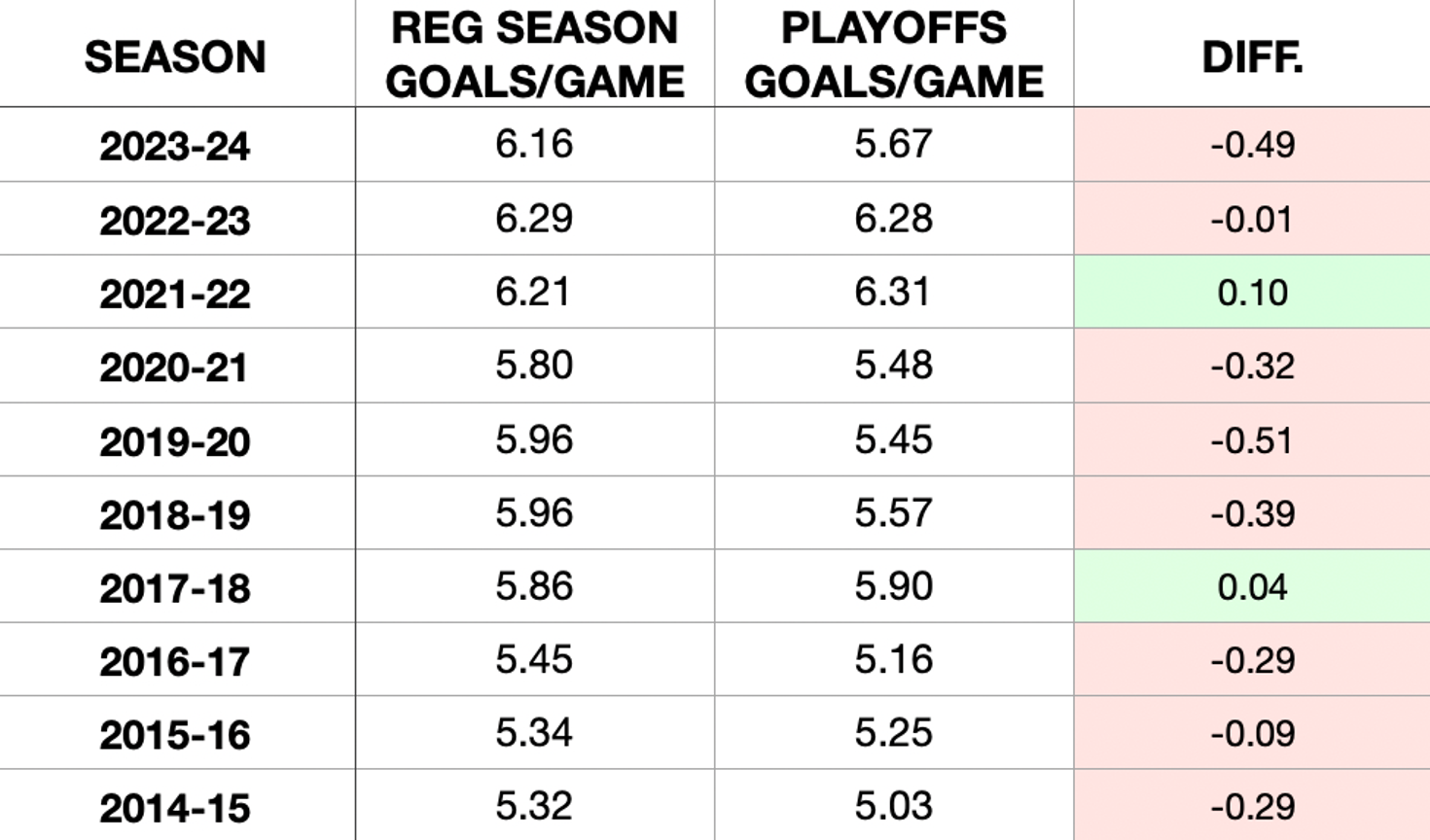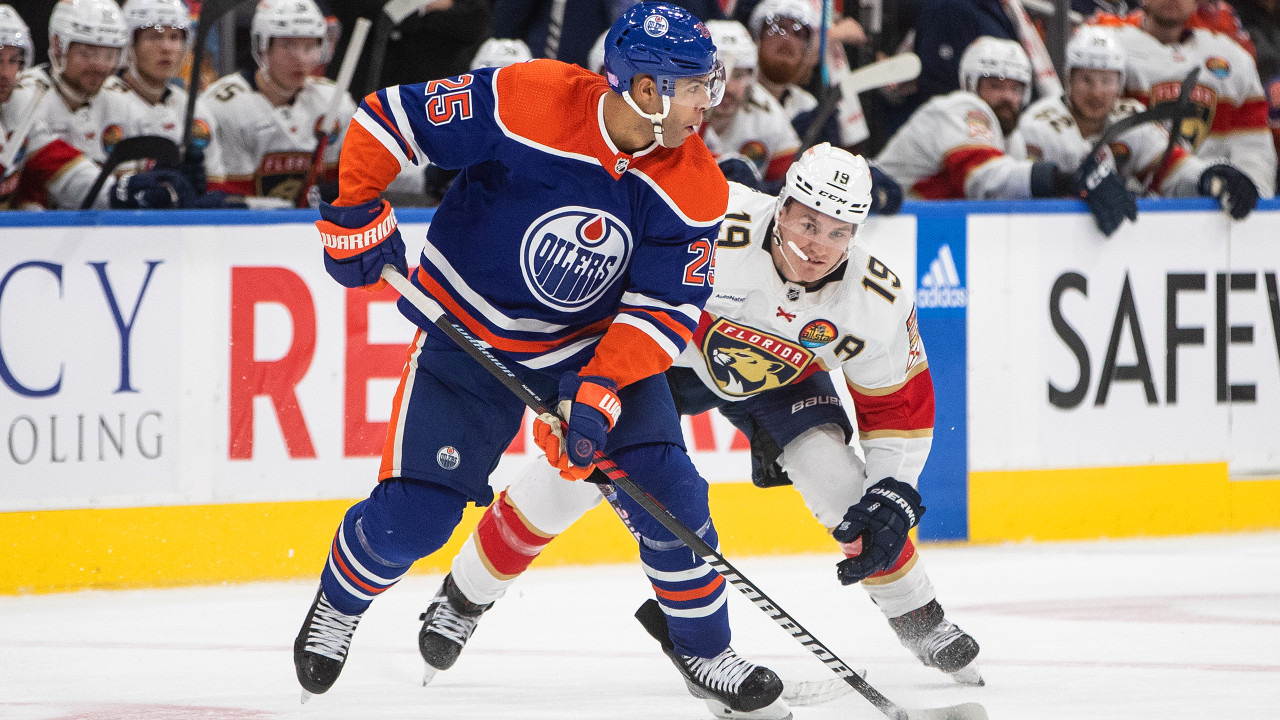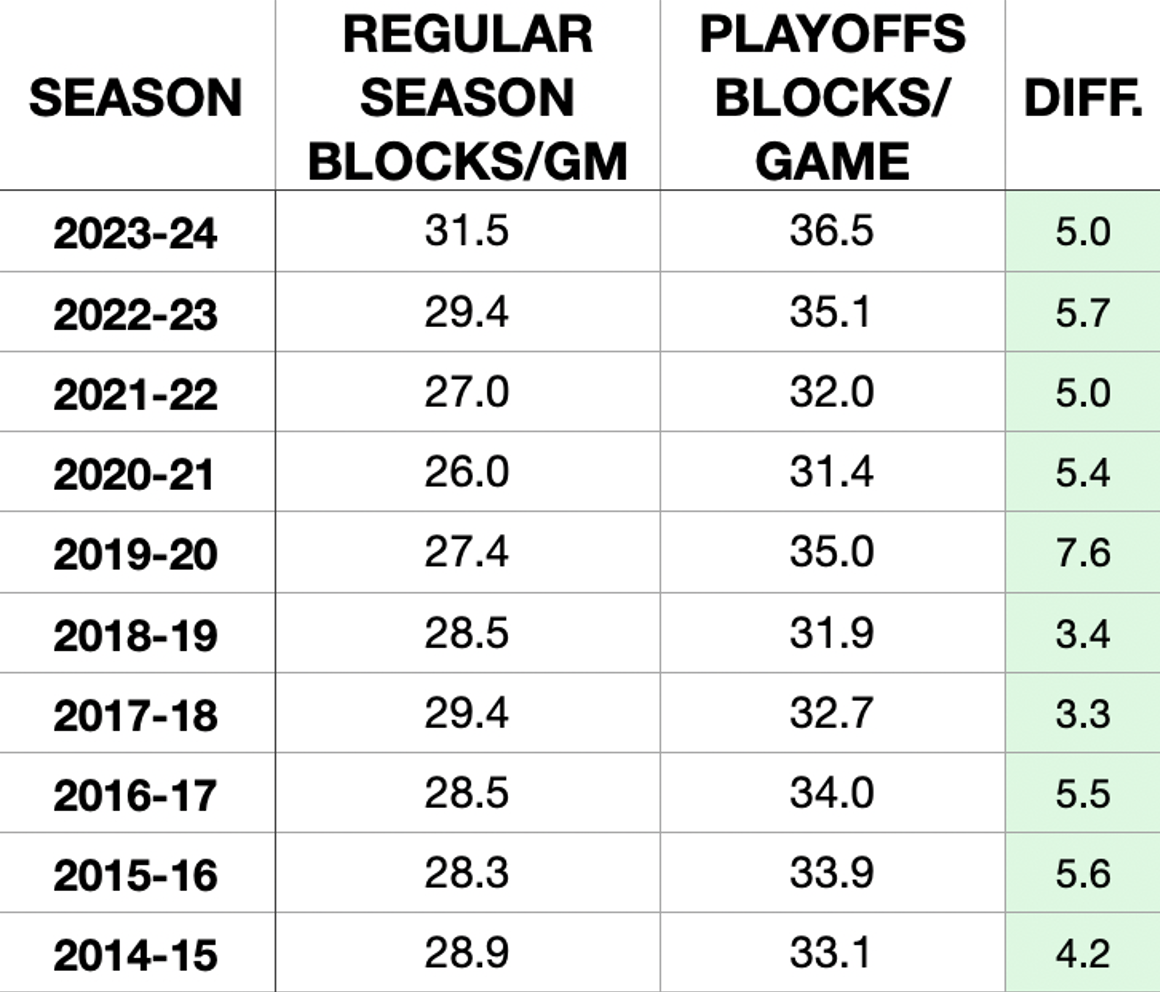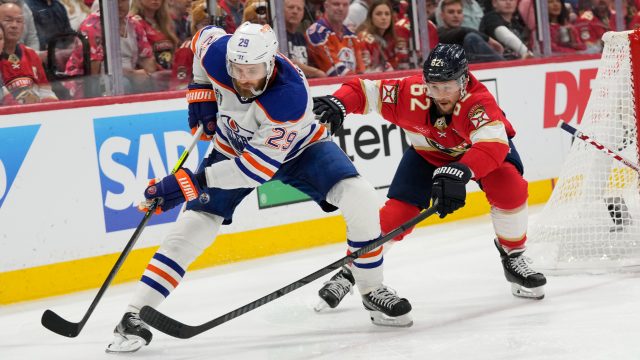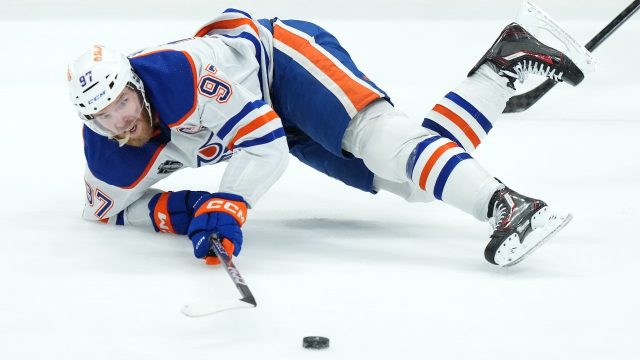
In eight of the past 10 years, the Stanley Cup Playoffs have brought a decline in goals per game compared to the regular season. This is not atypical in the NHL’s history, and highlights a commonly made point about what wins when the games matter most. Here you have the league’s 16 best teams — almost all of which generally find their way into the top-20 at producing offence league-wide — and you make them play a pile of hockey. In that vacuum, you’d expect to see better offensive players, more offensive plays, and likely more goals.
But of course, the same can be said for the best defences. Usually the 16-best teams in the league eat up the top-20ish spots in best defences and, when matched up against the best offences, we can see that historically the defences come out on top.
Excuse the clumsy colour-coding on the chart below (it’s a simple “red is negative, green is a gain”). I’ve just done it to show the years when there was less offence in the playoffs than in the regular season.
As you can see, this season is in the running to be the year with the greatest difference between how much teams scored in the regular season versus the playoffs. A few more low-scoring Oilers-Panthers games might get us there, as they’re capping off a post-season that has produced nearly half a goal less per game.
So, what’s to blame? What’s with the massive drop-off, and why do good offences tend to lose out to good defences?
Let’s use the Florida Panthers to illustrate. This season the Panthers were tied for first as the best defensive team in the NHL in terms of raw goals against, allowing just 2.41 goals-against per game in the regular season. After removing the bottom half of the league and playing just top-16 opponents in the playoffs, they’ve allowed…again a league best, this time 2.11 goals-against per game.
Let’s take a look at the five main reasons why Florida’s great defence has thus far quieted great offences.
Coaching
This is not about never-before-seen systems or anything revolutionary. It’s more about the growth in staff sizes leading to more information than ever before.
There’s so much video scouting now that teams will be prepared for every A, B, and C option an opponent can throw at them. They’ve had an analytics team lay out their best possible matchups to shut down an opponent. Scouting of special teams makes running a successful power play very challenging.
Every part of the game is assigned to some coach, and with that, teams struggle to catch defences off guard. Right now, Paul Maurice and his staff don’t seem surprised by anything the Oilers have thrown at them.
Related to this:
Coaches getting wingers to buy-in works like a nuclear deterrent
This is coaching too, but a separate point. The first point was more about how teams better understand what their opponent is going to do than ever before. This point is about their structure, and how teams that buy in and believe in the defensive side of the game defend without having to physically engage.
What I mean by that is, when your wingers don’t fly the zone and rather pack it in the defensive zone with everyone else, it works like a nuclear deterrent. You don’t have to steal the puck or hit when you have five guys back and layered, because offensive players with the puck – see McDavid, Connor – will note that if they take a guy on one-on-one there will just be another defender after that, so there’s no point in attacking and risking a turnover on a selfish rush.
McDavid has so far been stuck on the outside trying to get in against Florida, as the Panthers’ forwards haven’t been caught cheating thus far. You don’t see any of the Oilers challenging in one-on-one situations very often.
This to me is the biggest reason why we’re seeing so many games where a good offensive team gets something like 15 shots all game. It’s not that their opponent is checking them hard, it’s that the defences are occupying the dangerous ice, so it seems futile to challenge in, and offences get stuck on the outside doing nothing.
Goaltending
This post-season has kind of been the year of the Elite Goalie, though Stuart Skinner may not exactly fit that mold. But name goalies like Sergei Bobrovsky, Igor Sheskterkin, and Jake Oettinger went deep. This season some of the world’s best netminders made the playoffs and played well, from Jeremy Swayman to Juuse Saros.
There have been a few surprising goalie Stanley Cup victories over the past few years, but what Bobrovsky is doing this playoff season and the one before — building a Hall-of-Fame resume — is a reminder how crucial elite goaltending is to team success.
Methinks that’s good news for all of Saros, Jacob Markstrom, and Linus Ullmark this off-season, as teams maybe buy back into “name” goaltending.
Shot-blocking
Both the Panthers and the Oilers block a lot of shots, but it’s tough to show that with stats, considering they’re the two teams who have controlled possession most in the Stanley Cup Playoffs. If you’re in the offensive end more than anyone else, it’s tough to get your “blocks per game” up. But per attempt on their nets, both teams block a lot of shots. This is another contributing factor to why scoring goes down in the post-season — players are simply more willing to block shots in the playoffs. To wit:
And finally,
Physical play
The one thing I’ve always stuck to through my hockey writing over the years is some version of the phrase “the burden of proof is on the offence.” In the courts, the prosecution has to show beyond a reasonable doubt that the defendant is guilty to the jury. If they fail to do so, the defendant is off the hook.
In hockey, if you fail to produce offence the defence (and the other team) wins, which means that the goal for defending teams can be just to have nothing happen. The longer nothing happens, the happier the defence is, so the burden of creating and winning is on the offence.
And when what I’ve written above is true — more in-depth scouting, wingers back in the zone and packing in the house, good goalies and a commitment to blocked shots — it can be really hard to create much of anything. Now factor in something Florida does better than any team in hockey — they play physically and make doing your job hurt — and the idea of getting to the dangerous parts of the ice must be like eating expired food. It’s one thing to summon the courage to go for it, but it’s another to do it without hesitation and mild nausea.
These are all basic theories for why scoring goes down in the Stanley Cup Playoffs even when only the league’s best offences remain. And as noted, Florida does them all and does them all well, which makes the Oilers’ job of scoring goals a whole lot harder.
Edmonton is by no means done, not yet. But they’ll need some curveballs, some traffic in front of the goalie, and the willingness to take whatever shots are offered in exchange for the right to skate through the combat regions where the low-hanging fruit goals often await.


